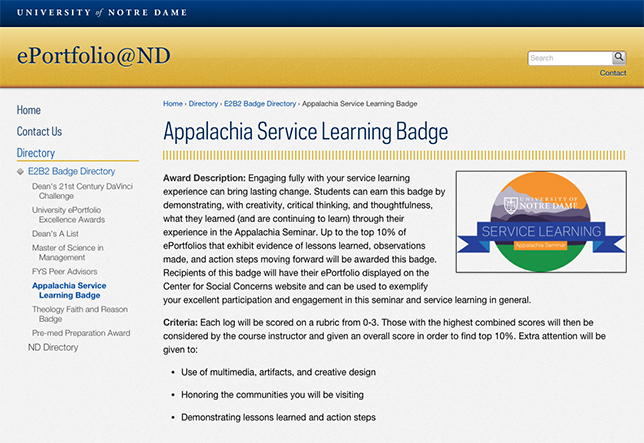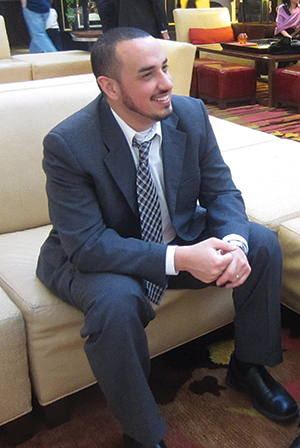Pairing E-Portfolios With Badges To Document Informal Learning
In order to support the recognition of co-curricular and integrative learning, the University of Notre Dame came up with a campuswide strategy to integrate digital badges in students' e-portfolios.
Category: Student Systems and Services
Institution: University of Notre Dame
Project: E-Portfolios With Evidence-Based Badges
Project lead: G. Alex Ambrose, associate professor of the practice and associate director of e-portfolio assessment
Tech vendors/partners: Credly, Digication

Notre Dame students can use digital badges to document informal learning in their e-portfolios.
E-portfolios have always offered an avenue to showcase informal learning, but at the University of Notre Dame's Kaneb Center for Teaching and Learning, digital learning designers realized that the maximum potential of e-portfolios on their campus was not being met. Most students were not taking full advantage of e-portfolios to document the integration of formal and informal learning.
The key, Kaneb's learning scientists determined, was to promote the inclusion of digital badges in the e-portfolio. "If we are going to harness the full power and promise of e-portfolios beyond a single course assignment and show employers what students know and can do, then we need the digital badge to communicate specific competencies with evidence and motivate students to make their learning and skills visible," said G. Alex Ambrose, associate director of e-portfolio assessment at the university. Ambrose and his team came up with a campuswide strategy to develop a technology integration for the university's digital badge and e-portfolio systems.

Project lead G. Alex Ambrose
The integration came about in three project phases. The first phase, said Ambrose, was in effect a do-it-yourself effort in which the project team coordinated between Notre Dame's Digication e-portfolio system and other campus-based systems. Students who wished to earn badges were asked to submit evidence to Digication's backend Assessment Management System, so that evidence claims for badges could be collected, scored and stored. After the evidence was evaluated and badges could be awarded, the team sent badge earners a picture file to display on their e-portfolio, along with a verification link that connected back to Notre Dame's badge directory.
As the project grew to the next phase, the team explored faster and easier — and free — ways to issue, claim and verify badges. Ambrose and his colleagues set up free accounts on digital badge service Credly, so students could have easier access to the next wave of badges.
The third and present phase moved the project from DIY "hack" to a true API integration. Notre Dame partnered with Credly and Digication to create a tighter integration that links student account profiles and provides a simple way to embed Credly digital badges into a Digication e-portfolio content module. That integration has fueled change in the e-portfolio community overall as the need to integrate digital badge and e-portfolio technologies gains attention, Ambrose explained.
The team is now beginning to explore what hyperlinks to e-portfolios and digital badges might look like on an official transcript. Ambrose emphasized that a strong evidence-based assessment culture and platform are essential to creating the space for innovation in designing, developing, delivering, evaluating, issuing and tracking digital badges. One of the greatest impacts of this initiative, added Ambrose, is the model it offers other campuses and institutions for collaborating with vendors to adjust technology to the education sector, rather than the other way around.
Going forward, the Kaneb center team plans to experiment with the role digital badges can play in incentivizing MOOC completion and operationalizing the Degree Qualification Profile (DQP) competency model (developed and incorporated by the Association of American Colleges & Universities and the wider education community). Also, the team has started text mining and social network analysis to determine whether useful learning analytics can be uncovered from informal learning data. Ambrose hopes that these data mining efforts could ultimately lead to learning analytics and dashboards that show student pathways and provide a holistic view of their progress toward specific outcomes.
Return to Campus Technology Innovators Awards Home
About the Author
Meg Lloyd is a Northern California-based freelance writer.